It is never easy to have perfect water conditions in your aquarium, not to mention when water hardness becomes an issue. Soft water poses stress or health concerns to sensitive fish types and this is because hard water contains mineral salts. But is soft water always better?
Content Table
This article will reveal how to soften water in a fish tank and how it influences fish and other water creatures and also highlight Do-It-Yourself techniques for softening fish tank water. From the battle against heavy water problems to the desire for perfect conditions, this article will work as a guide towards optimized and proper tips for making fish tank water soft for your aquatic pets.
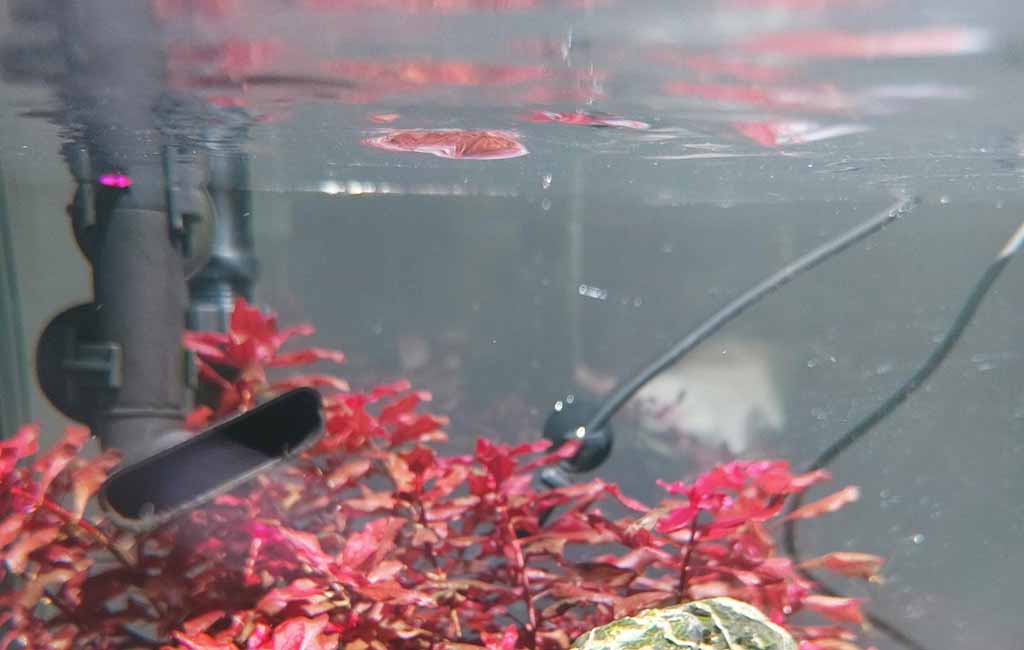
Fish tank water hardness
What Is Water Hardness?
Hard water can be defined as water that has s moderately high concentration of dissolved minerals, especially calcium and magnesium salts. These minerals play significant roles in biological as well as chemical activities in water-borne systems. Water hardness is typically expressed in terms of:
- Degrees of General Hardness (GH): Measures calcium and magnesium levels.
- Carbonate Hardness (KH): Measures carbonate and bicarbonate ions, which influence water buffering capacity and pH stability.
Hardness Values
| Soft Water 0-4 dGH | Moderately Hard Water 4-8 dGH | Hard Water 8-12 dGH | Very Hard Water 12+ dGH |
What Water Hardness Means for Aquatic Pets
Water hardness affects aquatic pets in several ways, including their overall health, breeding, and survival, etc.
- Physiological Needs
- Some species, like discus and neon tetras, thrive in soft water as it resembles their natural habitats.
- Others, like African cichlids and livebearers, require hard water for proper growth and reproduction.
- pH Stability
- Higher carbonate hardness (KH) stabilizes pH, preventing rapid changes that can stress or harm aquatic life.
- Shell and Bone Development
- Hard water provides essential minerals for shell-forming species (e.g., snails, and shrimp) and fish that need strong skeletal structures.
- Impact on Breeding
- Soft water species often need low hardness levels for successful egg fertilization and hatching.
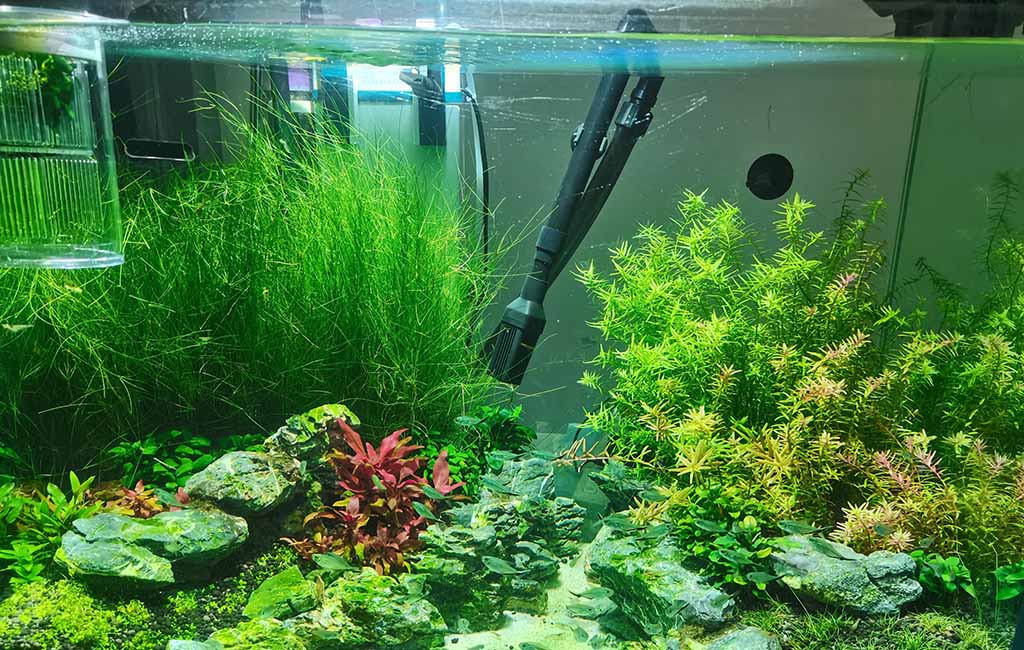
Aquarium water hardness
Hard or Soft Water for Fish Tank
Hard water and its impact on the balance inside fish tanks should not be underestimated and problems connected with this factor have to be solved. The choice between hard or soft water depends on the kind of fish and the aquatic plants you intend to cultivate. Let me explain to you a bit about their responsibilities and how they impact your home aquarium.
Hard Water in Fish Tanks
Hard water contains higher levels of dissolved minerals like calcium and magnesium.
Roles in the Tank
- Mineral Supply: Essential for species that require minerals for healthy bone development and reproduction.
- pH Stability: Hard water is typically alkaline (higher pH) and resists rapid pH changes, creating a stable environment.
- Beneficial for Certain Fish: Species like African cichlids, guppies, and mollies thrive in hard water because they mimic their natural habitats.
Pros
- Provides essential nutrients.
- Helps maintain consistent water parameters.
Cons
- Unsuitable for soft water species, as it can cause stress and health issues.
Soft Water in Fish Tanks
Soft water has low mineral content, often with lower levels of calcium and magnesium.
Roles in the Tank
- Mimicking Natural Habitats: Ideal for species native to rainforests and slow-moving rivers, such as tetras, discus, and angelfish.
- Breeding Conditions: Many softwater fish require low hardness for successful egg fertilization and hatching.
- pH Sensitivity: Soft water tends to be acidic (lower pH) and can lead to more fluctuations, requiring careful monitoring.
Pros
- Better suited for soft water species.
- Allows breeding of species that prefer acidic environments.
Cons
- Less stable pH, requiring buffering or regular adjustments.
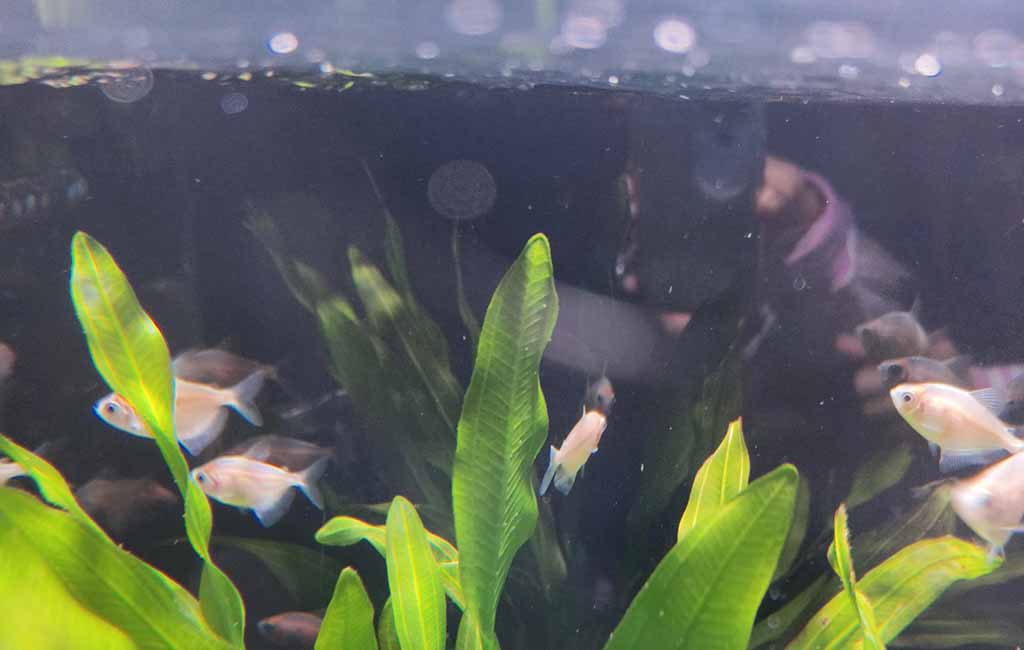
Soften water in a fish tank
Daily Home Aquarium Water: Hard or Soft?
The water type in your home aquarium should match the needs of the fish and plants you plan to keep:
- Tap Water: Most tap water is moderately hard due to added minerals, making it suitable for hard water species. It can be treated with conditioners for soft water aquariums.
- Hard Water Tanks: Great for African cichlids, livebearers, and other hard water species.
- Soft Water Tanks: For soft water fish, tap water may need to be softened using reverse osmosis (RO) systems or water conditioners.
What to Consider When Choosing Water Hardness
- Fish Species: Always research the specific water hardness requirements of your fish.
- Tank Plants: Some plants prefer soft water, while others thrive in hard water due to mineral availability.
- Water Source: Test your tap water’s hardness and adjust it as needed to suit your aquarium.
- Stability: Consistent water parameters are more important than achieving “ideal” hardness. Sudden changes can stress fish and harm their health.
Can It Use Soft Water in Fish Tank
Yes, you can use soft water in a fish tank, but it requires careful consideration of your tank’s needs. Soft water has low mineral content, which can have both positive and negative effects on the aquarium ecology depending on the species you’re keeping and how well you manage the water conditions.
Effects of Soft Water on Aquarium Ecology
- Fish Health and Stress
- Soft Water Species: They are good for certain types of fish coming from soft acidic water such as most tetras, discus, and angelfish. Such fish are in the low-miners group and may be stressed in hard water areas and hence have some health complications or poor breeding.
- Hard Water Species: Some fish adapt to hard water, especially African cichlids, and livebearers are likely to suffer in soft water. This makes it hard for them to grow, much less develop strong bones as there is little mineral content in their diet.
- pH Instability
- Soft water water is also usually acidic and it can thus cause water pH to change from one level to another very easily. Sudden shifts in pH levels are not good for fish and can cause a lot of health issues to the fish. Therefore, soft water needs more attention on how to control the pH because the buffering capacity (KH) is low.
- If your soft water pertains to a lower pH that is alarming to a certain species, then you may need to reacidify or neutralize, maybe with mineral additives or buffer solutions.
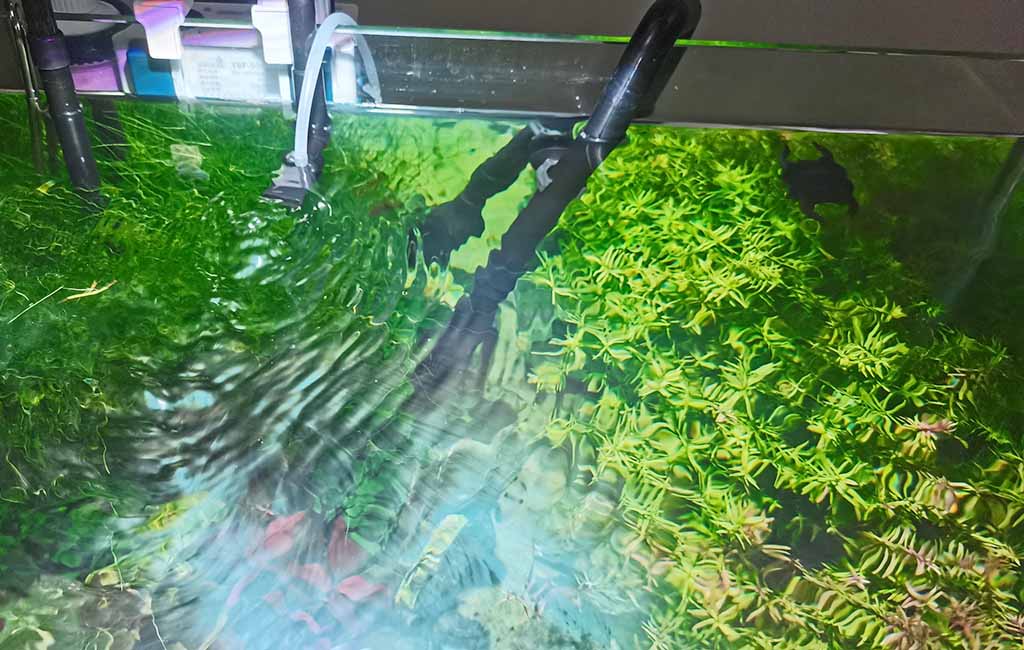
Soften fish tank water
- Breeding Conditions
- Some fish species mature best at water softness because such water conditions are similar to the source in the wild. Freshwater fish such as discus and guppies require soft water for either egg fertilization or hatching.
- If you are targeting to breed softwater fish species, it is very important to control the water parameters to improve your chances of getting spawns.
- Plant Growth
- Soft water is ideal for specific plant species that like low mineral content in their water like specific water specifically aquatic plants from Southeast Asia. Though some plant species might find it hard to cover their nutritional needs due to weak cell walls, the absence of minerals such as calcium and magnesium is a big problem for plants.
- If you are using soft water to grow your plants, it is important to use supplements due to hard water species, for correct growth.
- Mineral Deficiency
Soft water does not contain the right minerals for some invertebrates such as snails and shrimp that require calcium in the construction of their shells. These species might need also additional minerals or a combination of both soft and hard water since recently it was proved that they need extra calcium.
Soften Hard Water in a Fish Tank
One problem associated with hard water is that it contains calcium and mag. Some fish and plants cannot be grown under hard water conditions. The water needs to be softened if you have the species that need soft water: tetra, discus, and some aquatic plants, for instance. There is a short list of remedies for softening water in fish tanks below.
Methods to Soften Hard Water in a Fish Tank
- Reverse Osmosis (RO) Filtration
- How It Works: Reverse osmosis also eliminates most dissolved materials, which are usually accompanied by hardness agents such as calcium and magnesium.
- Best For: If you are a discus breeder, an aquarist who uses tetra fish, or a person who has sensitive plants, RO water is the only way to go.
- Considerations: Most RO water is almost entirely demineralized, and this means you may need to add remineralisers to ensure that you have adequate amounts of trace minerals.
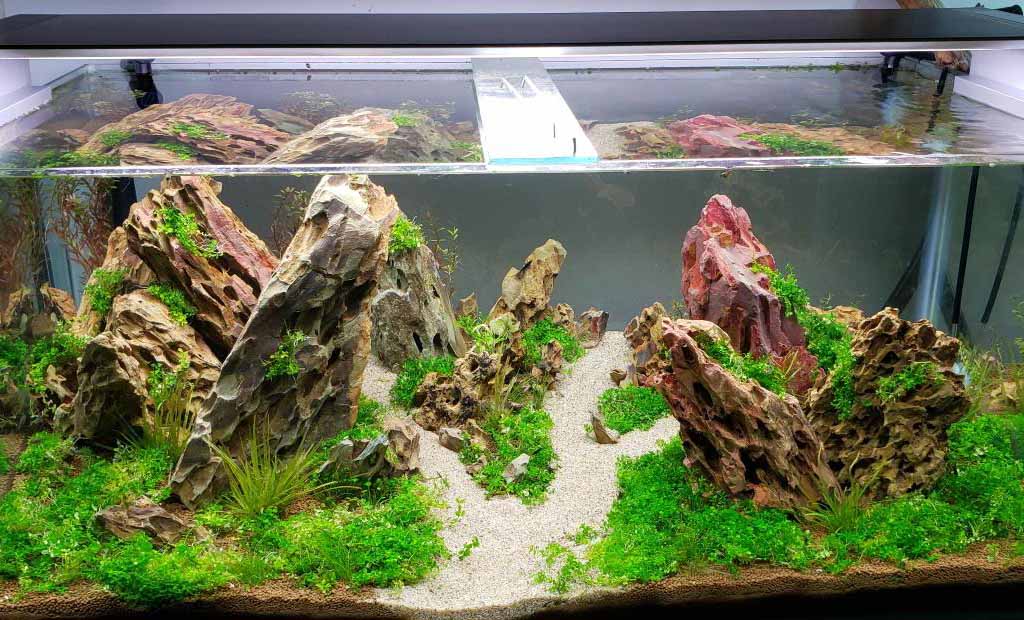
Ways to make fish tank water soft
- Peat Moss
- How It Works: Peat secretion contains tannin and humus acid in the water which softens the water naturally and decreases the water’s PH to resemble the water environment with soft water from peat water.
- Best For: Fish such as blackwater fish (neon tetras, angelfish, discus, etc) that are favored in acidic soft water fish.
- Considerations: It is also important to note that peat will also tend to color the water a yellow color which is not dangerous for the fish but may be unappealing to some aquarists. These changes call for constant water changes within the habitat to help contain the range of changes in water conditions.
- Water Softening Pillows or Pads
- How It Works: These are over-the-counter products which are water softeners that contain ion exchange resins that filter out calcium and magnesium ions. Some of them can be disposed of in your filter.
- Best For: General demineralization of water in aquariums requiring fish such as guppies or bettas that only require a slight softening of water.
- Considerations: These pillows have to be replaced or regenerated at some point in time. It is easy to use and efficient but the removed minerals may not be so less to meet highly sensitive fish species.
- Distilled Water
- How It Works: It is as effective as rainwater with no dissolved mineral content, thus making it the perfect base solution to soften water.
- Best For: When it is necessary to reduce the PH levels of fish that need extremely soft water such as discus or German blue rams.
- Considerations: Hence, similar to RO water, distilled water is low in minerals and you will have to add mineral supplements to include calcium, magnesium, and those trace nutrients. It can be added to tap water to flatten the hardness to an acceptable level.
- Mixing with Soft Water Sources
- How It Works: If you can get naturally soft water such as rainwater, you can use it to soften water by diluting it with your hard water.
- Best For: Forced water condition aquariums which are plants and fishes that do well in soft water including bettas, neon tetras, or shrimps.
- Considerations: Check that the water supply is clean and bacterial-free and pay close attention to the water hardness after dilution to ensure it is not too soft.
- Chemical Softening Agents
- How It Works: Some chemical products are meant to soften water in fish tanks because they are capable of precipitating calcium and magnesium and thereby lowering the water
- Best For: For the temporary reduction of apparent water hardness or for aquaria where a gradual variation of the hardness is desirable.
- Considerations: These products should be applied judiciously because their over-application creates water imbalance and affects the lives of the aquatic animals.
- How It Works: Some chemical products are meant to soften water in fish tanks because they are capable of precipitating calcium and magnesium and thereby lowering the water
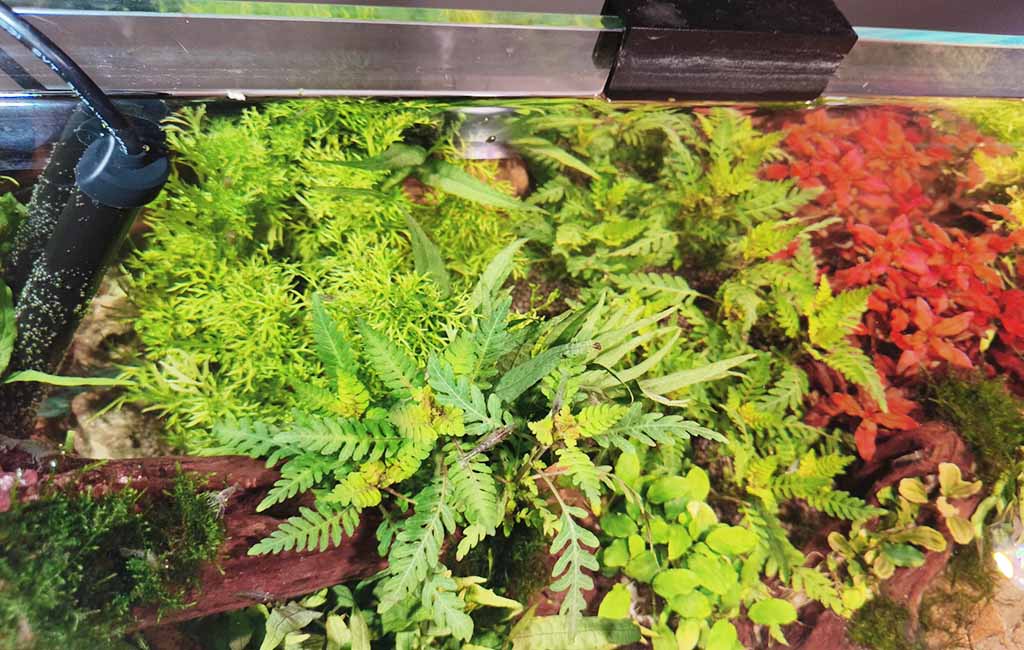
Make fish tank water soft
Species-specific Considerations When Softening Water
- Tetras, Angelfish, Discus (Soft Water Species): These fish are pond adaptable, or more specifically they live best in water that is soft and slightly acidic with a pH level of 6-6.5. The best way is using technology like reverse osmosis, using peat moss, or diluting the sample with distilled or rainwater.
- African Cichlids, Guppies, and Mollies (Hard Water Species): These species only thrive well under hard alkaline water conditions. It may not be appropriate to soften water for them as that could make them stressed and their immune system compromise, besides, they are impossible to breed.
- Livebearers (e.g., Guppies, Swordtails): These species can dwindle in relatively hard water quality, though moderately hard water is optimal, thus softening should not be practiced too often.
- Aquatic Plants: Soft water fish such as neon tetras, cardinals, angelfish, MTS, etc are very compatible and many of the aquarium plants like Anubias, Java Fern, etc are hard water tolerant also. But for some hard water-dependent plants such as some types of moss or moss balls, you may find that your plants will not grow well in soft water without the addition of minerals back into the tank.
Filling a Fish Tank with Soft Water
To fill a fish tank with softened water, follow these steps:
- Prepare Softened Water: Use RO, distilled, or mixed rainwater.
- Check Parameters: Test pH, hardness (GH), and temperature.
- Gradual Addition: Slowly add softened water to avoid shock to the fish.
- Re-mineralize (if needed): Add remineralize to restore essential minerals.
- Monitor: Regularly test water conditions for stability.
Concluding Thoughts
In conclusion, it is important not to go too high or too low with the water hardening for the best well-being of the species in the aquarium. The nature of the water that you decide to use between soft and hard water will depend on the kind of fish species you possess. With the help of such techniques as reverse osmosis or peat moss, you can maintain reasonable and suitable fish and plants’ living conditions in the water.
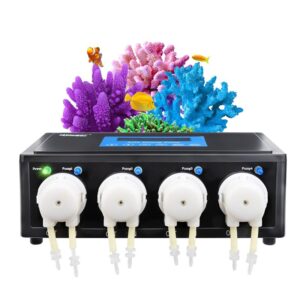
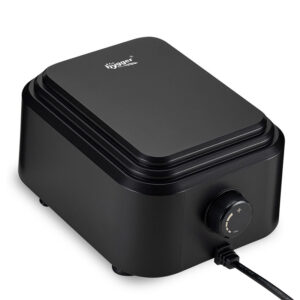
Leave a comment